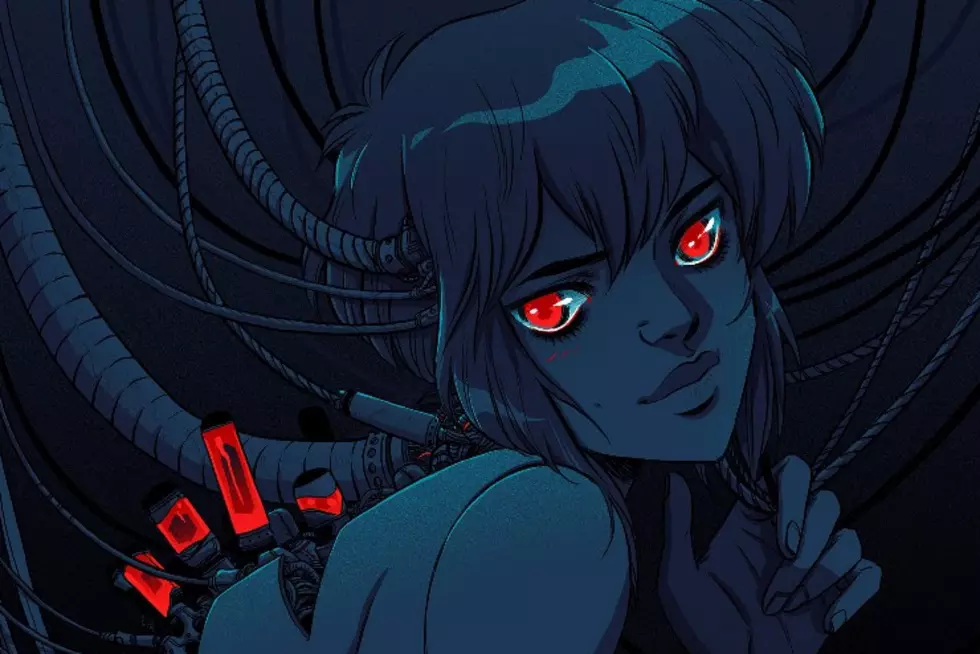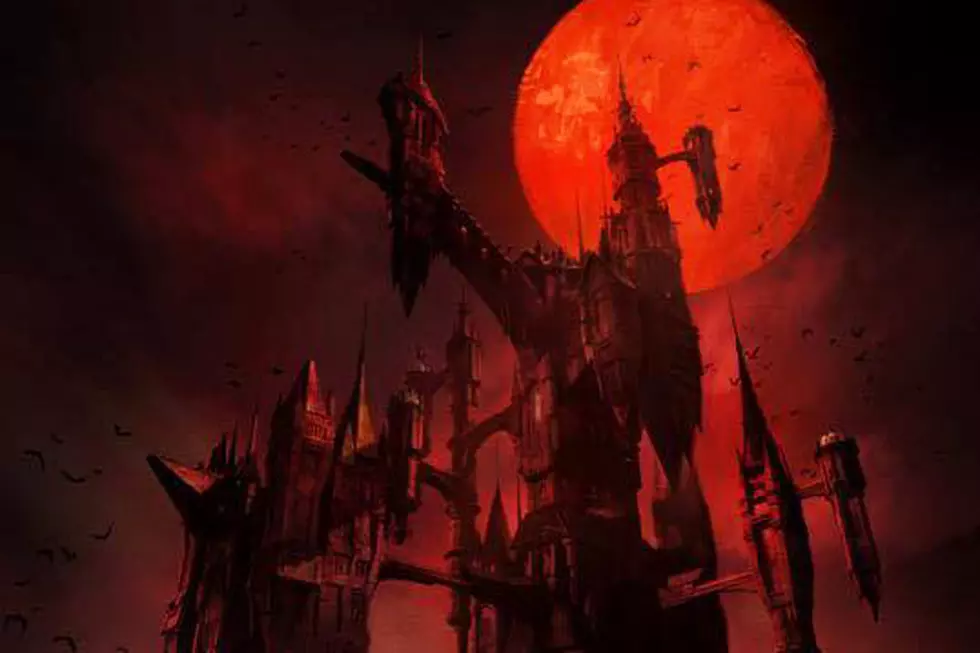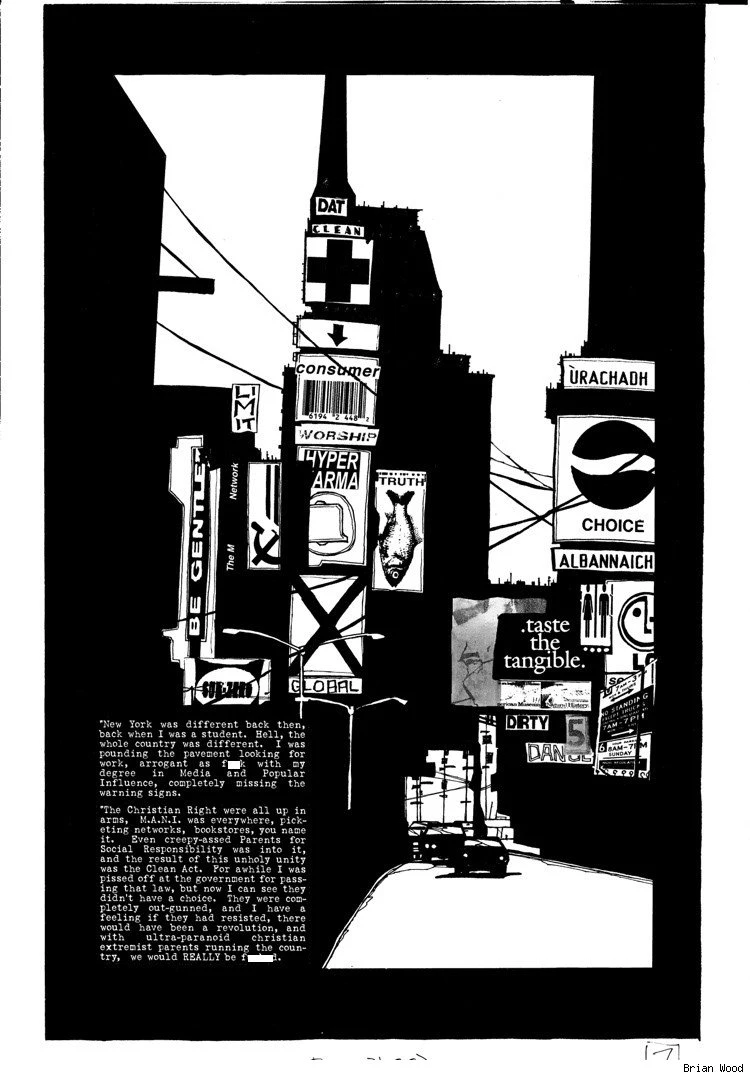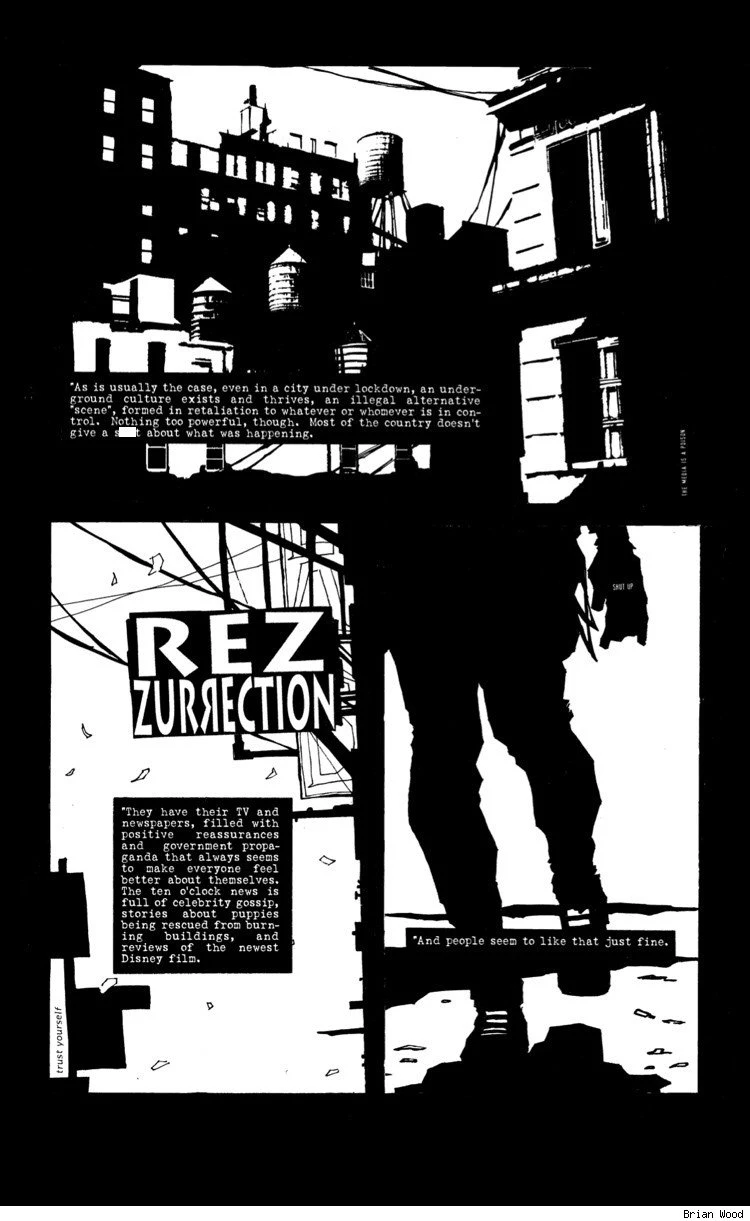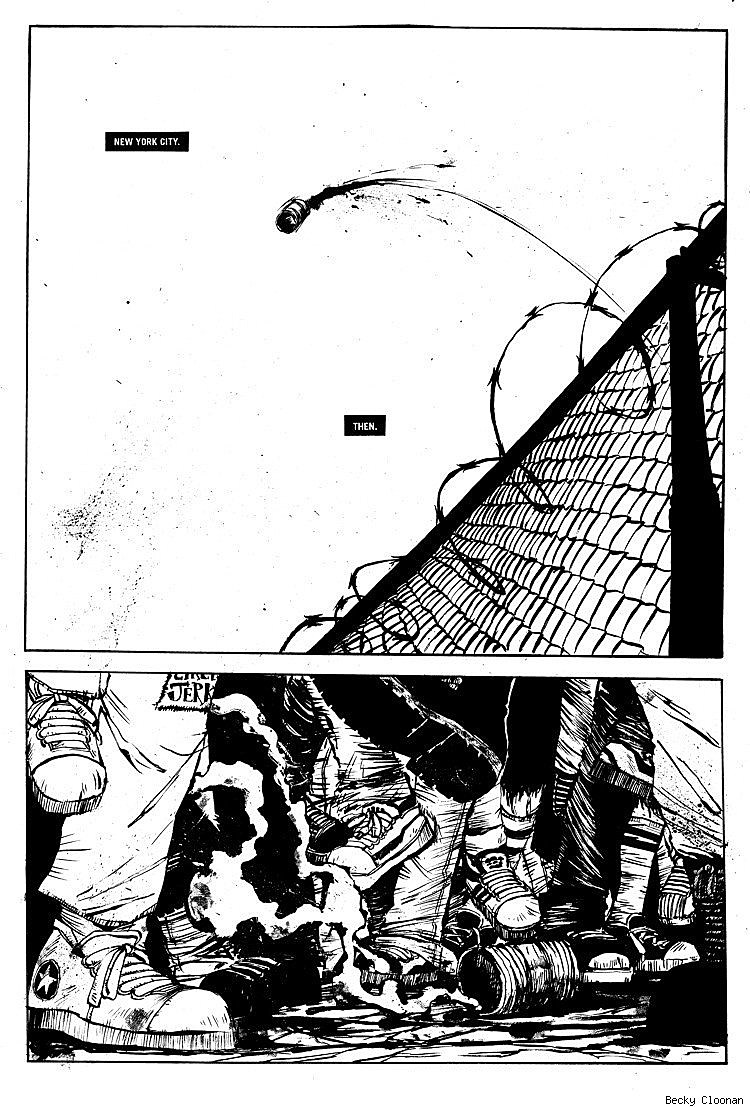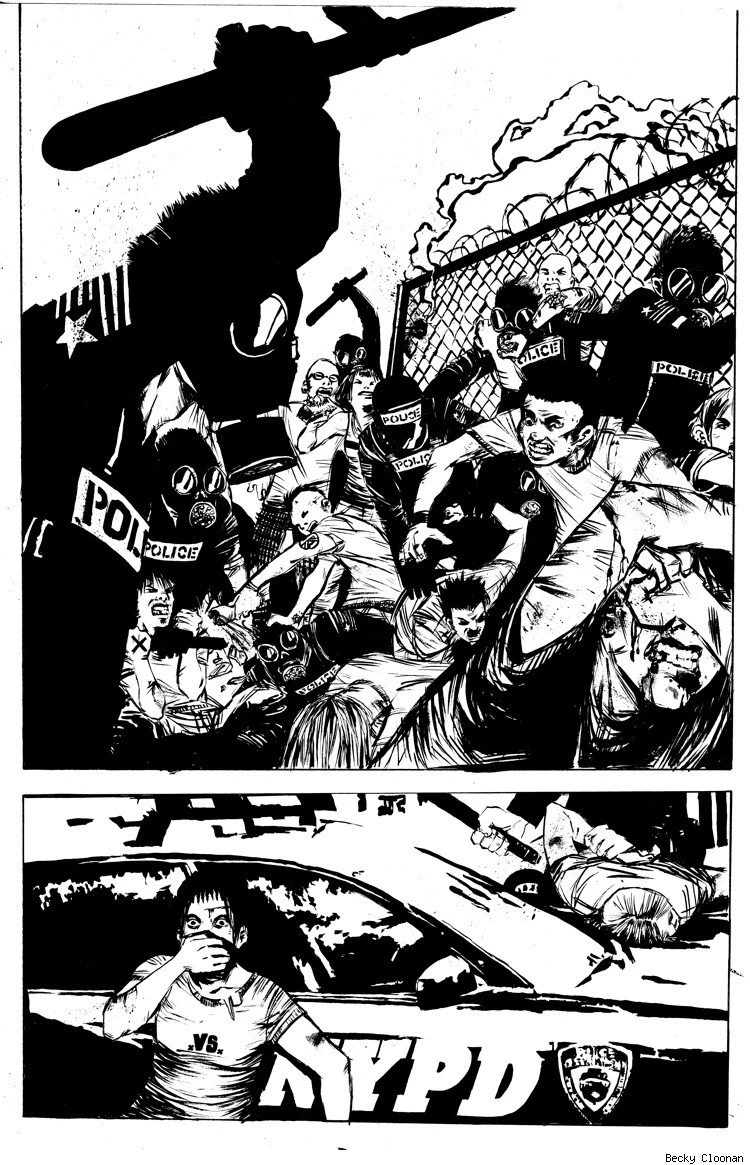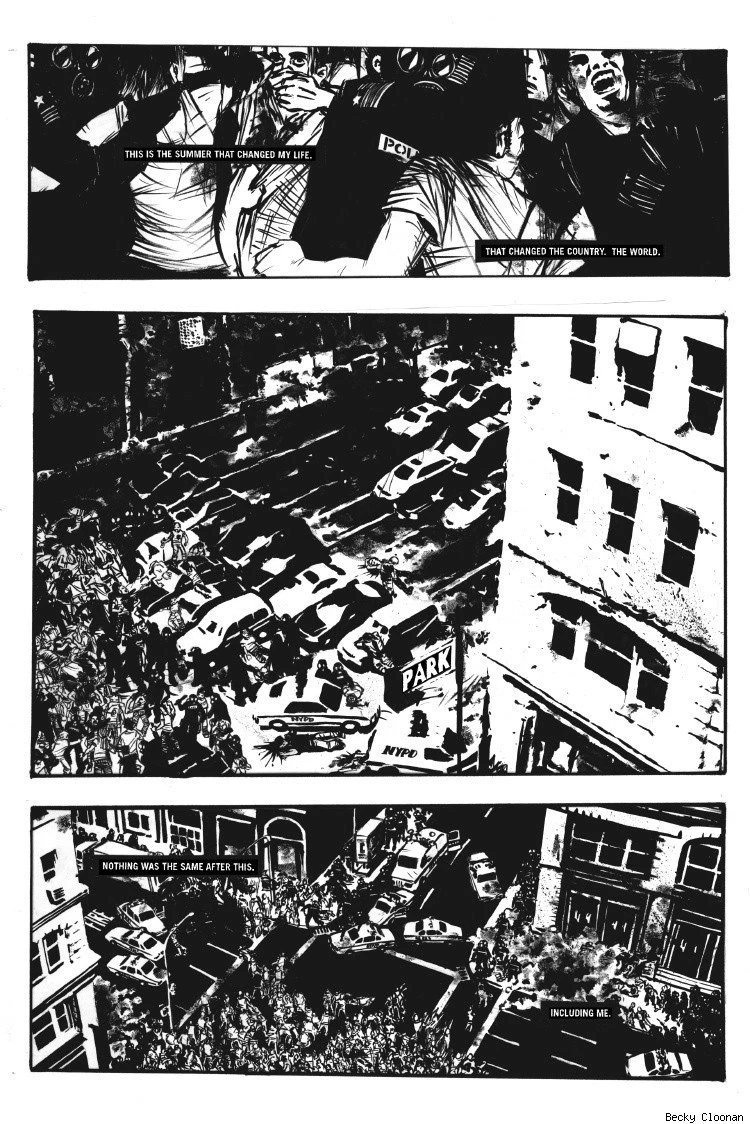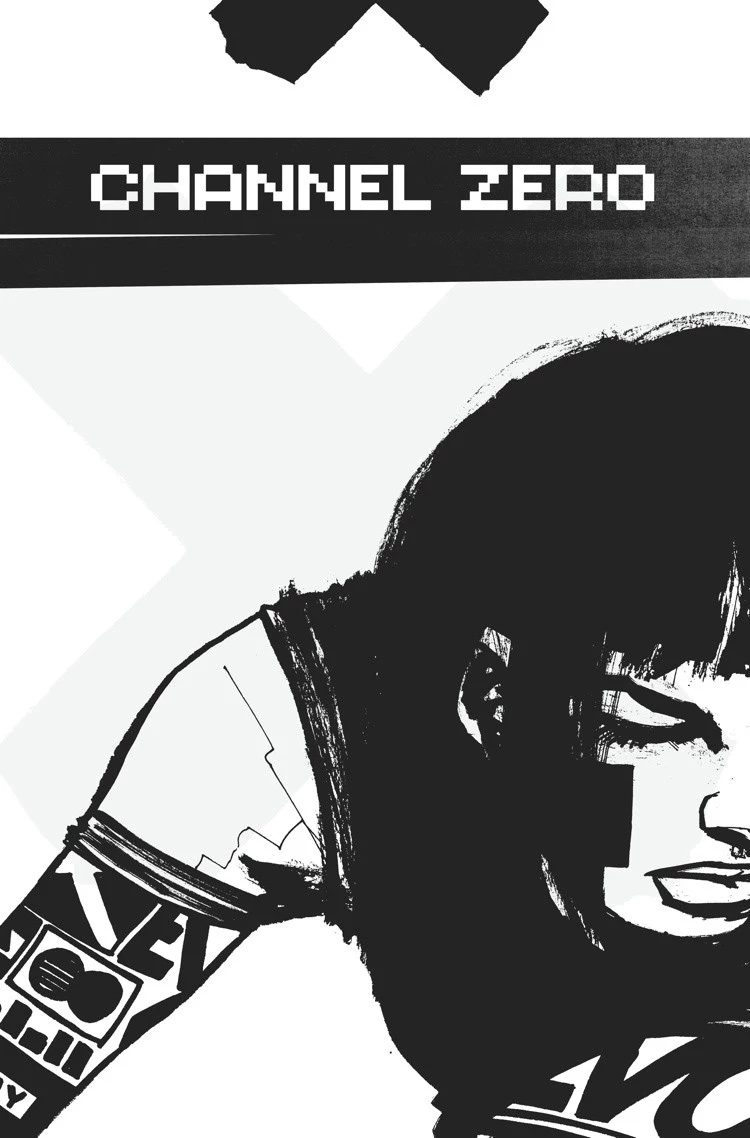![The Eerie Prescience of Brian Wood’s Debut Work ‘Channel Zero’ [Interview]](http://townsquare.media/site/622/files/2011/12/cz1.jpg?w=980&q=75)
The Eerie Prescience of Brian Wood’s Debut Work ‘Channel Zero’ [Interview]
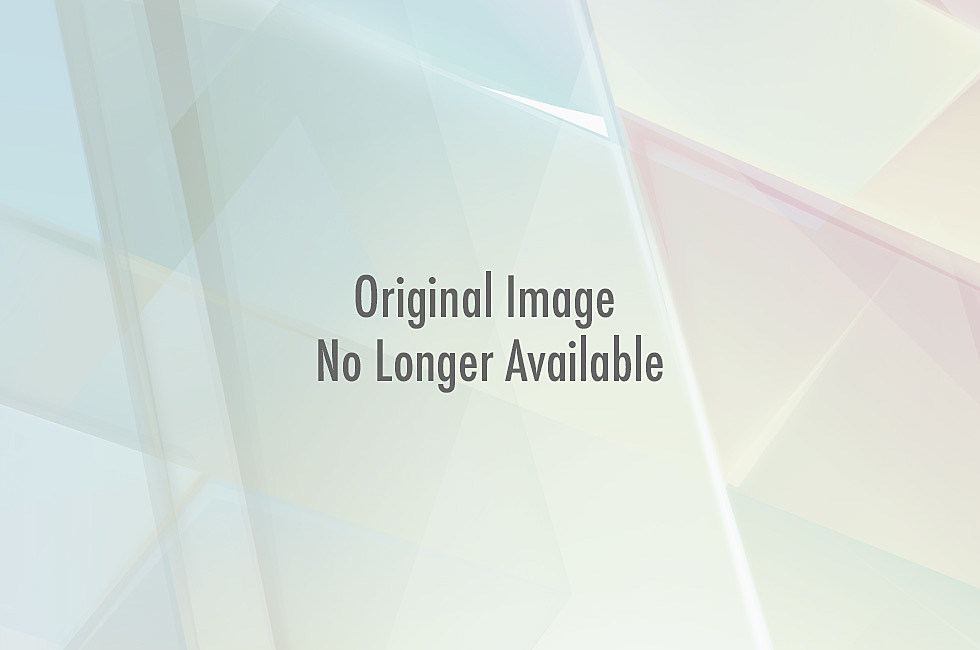 If I didn't actually remember where I was and when I first read Channel Zero, I might have picked up the forthcoming Dark Horse special edition of Brian Wood's debut work about a heavily tattooed techno-media revolutionary and her war to reclaim free speech and assumed it was created in direct response to some major political developments of America's new century: the Patriot Act, the Stop Online Piracy Act, Occupy Wall Street. The truth is that Image Comics released the first issue of Channel Zero all the way back in 1998, and it's achieved that "eerie" science fiction descriptor by depicting what has turned out to be an astonishingly on-point conflict between young people and the powers that be. Indeed, it's pretty difficult to imagine even the esteemed Occupy Comics creators coming up with anything that reflects the spirit of rebellion as well as Brian Wood's nearly 15-year-old opus.
If I didn't actually remember where I was and when I first read Channel Zero, I might have picked up the forthcoming Dark Horse special edition of Brian Wood's debut work about a heavily tattooed techno-media revolutionary and her war to reclaim free speech and assumed it was created in direct response to some major political developments of America's new century: the Patriot Act, the Stop Online Piracy Act, Occupy Wall Street. The truth is that Image Comics released the first issue of Channel Zero all the way back in 1998, and it's achieved that "eerie" science fiction descriptor by depicting what has turned out to be an astonishingly on-point conflict between young people and the powers that be. Indeed, it's pretty difficult to imagine even the esteemed Occupy Comics creators coming up with anything that reflects the spirit of rebellion as well as Brian Wood's nearly 15-year-old opus.
Wood went on to write such notable works as Vertigo's DMZ, Northlanders, The New York Five and Demo; Oni Press' Local; and WildStorm's DV8: Gods and Monsters, among others. But Channel Zero is especially distinctive -- not just for its own qualities and prescient subject matter, but also because CZ makes a very convenient landmark in the history of comics' recent past. The book was a lightning rod for a very influential sect of the comics internet community; it represents an arduous, expressly DIY method of comic book-making that new technology has dramatically changed; and unlike many premiere works, CZ makes it very plain where its creator is aiming to go with his career in terms of stories, characters and aesthetics.
That last point is especially obvious to me now that Dark Horse is preparing to release a special edition of Channel Zero (packaged with its Becky Cloonan-illustrated prequel, Jennie One) and as Vertigo is preparing to ship its final issue of DMZ, both of which represent a phase of Wood's career that is giving way to what he told us is a "radical" shift in the way he'll write comics going forward. We spoke to Brian Wood about that and his new works, The Massive and Conan the Barbarian.
ComicsAlliance: Like a lot of people, I first became aware of Channel Zero with the AiT/plaNETlar graphic novel edition in 2000, which was heavily promoted by Warren Ellis and the comics internet of the day. It seemed to me a dramatically planted flag of creative intent: the kinds of stories you were going to tell, the kinds of characters you were interested in, and a very specific kind of aesthetic and design sensibility you were inspired by. CZ was followed up with some other projects that shared some of that DNA in one way or another, like the Couriers trilogy, Demo, even the Global Frequency covers you created. I tend to see DMZ as the culmination of all that graphic design and photography and zine-making and New York street art/culture-inspired material. Would you say that's accurate?
Brian Wood: DMZ is certainly a point where I felt I had become the master of all of that, all those ideas and techniques, and figured out the best way to present it that was coherent, marketable, and contained within a story. I love Channel Zero to death, but it was not an attempt to tell a story, at least not anything approaching a traditional one. I started it as an Illustration major in art school and that was my focus: the art. I had too many ideas, a lot of passion, a lot of anger (especially at local politics), and that freedom one has in an art school environment to just go off. I was also learning the tools and techniques of comics entirely on my own, since, unlike the nearby School Of Visual Arts which has a comics-creating program, my school (Parsons) had nothing. So I was really figuring it all out myself. I was shouting, essentially, with Channel Zero.
It was a great way to start a career, looking at it in retrospect. I would have much rather have muddled through it all myself as I did than be cultivated by an editor or enter the ranks as a work-for-hire guy. I tried a bit of that in 1999-2000 at Marvel, and at that time it just wasn't right. I was the guy who, at the very start of his career, quit a relationship with Marvel to go do original graphic novels for tiny, non-paying small presses.
CA: The first few pages of Channel Zero read very eerily today. In the last few weeks we have seen the government (local governments, anyway) censor the media by forbidding them to cover the eviction of some of the Occupy protests in various cities, notably New York. CZ is based on the premise of government censorship of media content. We have seen the power of portable communication technology like mobile phone cameras and "pirate"-like broadcast media like Ustream and Twitter and so forth. CZ discusses explicitly how portable technology can empower a populace to circumvent the boundaries of the media. The list goes on.
BW: Channel Zero is so explicitly tied to the past -- my past, as its creator -- that sometimes I have a hard time seeing its relevance today. But since Occupy, I can kind of, since Occupy resembles so much of the protesting that happened in mid-'90s NYC, at least superficially.
One thing that strikes me when I look at CZ is how quaint parts of it have become, living as we are in this deeply pessimistic and divided post-9/11 world. A loss of freedom of speech, a central theme in CZ, used to the worst thing your government could do to you. It was an almost unspeakable crime. Now, of course, our government can arrest, torture, and imprison you for no crime whatsoever. It can start entirely fabricated wars with seemingly no real opposition. And it has a fleet of robotic airplanes than drop bombs on people it only barely suspects might be up to no good. And because of new media, we have plenty of freedom of speech, even with cops restricting access to Occupy sites.
It's shocking to me, looking at CZ and thinking about how much has changed.
CA: I think it would be impossible for a new reader, particularly someone in their late teens or early 20s, to divorce the story of Channel Zero from the events of today. But what was going on when you created it? What events or ideas were you specifically reacting to? I think you must have been working on it before the first election of George W. Bush?
BW: I started it in 1996. It was [former New York City Mayor] Rudy Giuliani's "Quality Of Life" campaign that so drastically changed things for so many people, most notably the poor, students, artists, and minorities. I actually called him out by name, in both Channel Zero books, something that got me a lot of heat post-9/11 when the world was so in love with the guy. I also would just point out that towards the end of his time as mayor, City Hall park was ringed with cops, 24/7, closed off to the public, ringed with concrete barricades and checkpoints. I was not alone in my feelings for the man. In a way, I think the worst of the civil liberties crackdown that happened during W's terms, and what's happening now with Occupy had a dry run during Rudy's time as mayor.
CA: One of the things that people took notice of when Channel Zero was originally released (and rereleased) was its strong zine vibe. Here was this professionally published comic with a sophisticated narrative that was seemingly created in a method us kids could comprehend. I think it's safe to say CZ inspired a lot of people in that way, making "making comics" seem like something demystified and attainable. I recall a distinct sense of community around this book in the comics scene, don't you?
BW: One mistake that is often made is for this book, and for me, to be labeled as a product of the [Warren Ellis Forum, a heavily trafficked comics advocacy/criticism/meme discussion board that ran from 1998 to late 2002] when the reality is that Warren and I connected, I believe, before the WEF started. I forget exactly when, but it was early enough that I was able to get a pull-quote from him to run on the cover of Channel Zero #2, which was released around April of 1998 [by Image Comics]. I started my own Delphi forum right around the time the WEF was born. But I was very active on the WEF, and most people who read CZ were, like you, reading the 2000 [trade paperback] edition from AIT.
And CZ had that strong zine vibe because that's exactly how I created it. I didn't own a computer. I used ink, paper, glue sticks, and a lot of black market Kinko's copy cards (I had friends on the inside). I eventually bought my own photocopier, which changed my world. But by that point I had a lot of experience in making photocopied minicomics... we all did, that was what you did... and there was no other way I could have approached the making of Channel Zero at the time. Looking back, I'm struck at how easy it was: you make your marks on paper, paste it up, run off copies, and staple it. The end product is rough, sure, but there is no way that is harder than doing it all digitally. You just need the tools, and space. I guess you need a lot of space for that. It's messy.
Not to sound old and overly nostalgic, but that was just a magical time for me, where I felt more creativity and freedom in a single day than I do in a week or a month now.
CA: CZ invoked those kind of cheaply printed Kinko's books, necessitating black and white pages, photocopy-style images, a prodigious use of negative space in the artwork. In other words, CZ took the form of the underground publishing of the time. But if you created CZ today, when full-color comics and digital technology are within the reach of every aspiring creator, what form would the book take? Would it even be a book?
BW: I take a look at other books out there, more recent ones, ones that are heavily design-oriented like CZ was, but created with current tools and software, and I do wonder if this is what I'd be doing now. Certainly CZ was me doing this exact same thing with what was available to me. But I have no idea. I'd like to think that if I were starting out now, I would still be drawing traditionally, ink on paper, but who knows? I can certainly see the appeal of the Wacom and Cintiq. I have a Wacom I use once in awhile, mostly to color and correct scanned artwork. But I think it would be a book. I'm very opened minded to all things digital, but 95% of my purchases of books and the like are still paper.
CA: When you were recompiling Channel Zero for the Dark Horse collection, what struck you most about the work? Creators always say they're embarrassed by their mastery of technique in older work but besides that, did you enjoy revisiting CZ and Jennie One?
BW: I've long gotten over the fact the work is rough. I kind of had to, considering how many times this book has seen print in the last 15 years. At this point its primary purpose is as an artifact, a "see where it all began" sort of thing. I give myself a break: it was my first real comic, the first time I wrote any kind of story, it was designed as a college project, not a professional comics series, and I had zero sense of what it meant to make a comic. I read comics, but the comic industry? Literally, no idea. No access to it whatsoever. I went into St. Marks Comics to buy Hate and Dirty Plotte and Minimum Wage, and everything else in there belonged to a different culture. When [Image Comics founder and then-Publisher] Jim Valentino called me up to tell me what the orders were in Channel Zero #1 - 4,500 copies - I had to ask him if that was a lot or a little. I had no frame of reference.
As a side note, Jim Valentino is the man that "found" me and got me in the door as a creator, if I had to cite just one person. I handed him a 14-page preview of the book at my first-ever San Diego Comic-Con trip.
But to answer your question, yeah, its always enjoyable going over this stuff. Especially discovering some really early Becky Cloonan sketches that I haven't laid eyes on since 2001 or whenever it was we started working on Jennie One.
CA: Along those digital lines, you wrote a heavily proliferated blog post on the nature of digital comics distribution as it concerns working creators. To paraphrase, you worried that if the digital market remains restrained in terms of prices, it's that much harder for creators to make a living. Obviously we wrote about it but I'm wondering what kind of response you got from fellow creators as well as from retailers.
BW: I'm actually planning a big followup essay to that so I don't want to get into it too deeply here, but I got three distinct reactions: overwhelming support and agreement from readers; mostly positive support from fellow creators but a lot of commiseration as well, and some weird silence from people I expected to hear from; and then some very alarming pushback from some (and I stress the word "some") people on the retail side, store owners and advocate types. Which is not that surprising, but it did help me to pinpoint some really key stumbling blocks, things that we as a collective group of people (the "industry") need to resolve before any forward movement can happen. Right now we're in some weird standoff, Mexican-style with revolver pointed at each other's heads.
CA: I think a lot of observers were caught off guard by the financials you Tweeted about in connection with your blog post. You said you "took a 30-40% hit last year." I don't want to get too much into your personal business, but that is a big drop regardless of whether you're referencing total income or backlist sales or page rates or anything else. You're a creator with quite a lot of creator-owned work in print and from a variety of publishers who do pay royalties. The economy and the comics business must be pretty grim for creators if you're sweating and having to take on so much work-for-hire stuff (at least, "so much" relative to what you were doing before). Can you talk more about this and why you feel compelled to plan an "exit strategy" from comics?
BW: Total income. It comes from all corners: when my DC exclusive ended, my page rate dropped back down to what it was in 2005, and I spend close to $2,000 a month for health insurance for the family now that I'm off DC's plan. That loss of income is at least something I could anticipate and plan for. But there's also been a steady decline over the last several years of backlist sales, and declining page rates at all companies. The result of all of this is I have to take on more work, for less money, to only take a 1/3 hit.
I'll also state that work-for-hire doesn't necessarily pay better than creator-owned, at least in a publishing deal where page rates are being paid. No comics job I've ever had has paid me better than DMZ has.
The "exit strategy" is something that sounds alarming, but its not really, and it's also not that imminent. It's really just common sense. Right now all my eggs are in the comics basket, but obviously that is not as stable or lucrative as it once was, so you have to diversify. I need to be writing for different media and for different clients, so if one goes away I'm not dead. A lot of my peers are doing the same thing, right now.
CA: What advice do you have to creators wishing to emulate your largely creator-owned career path?
BW: Don't quit your day job -- literally. If you want a career in comics, just wait for a couple years. Don't stop making comics, don't stop pitching and trying, but do not think a career is waiting for you. Every company out there is running on fumes right now.
CA: Getting back to the work, the return of Channel Zero to print makes it very obvious to me that we're in the midst of a very distinctly different phase of your career. Maybe it started most obviously with Northlanders but it's definitely continuing with your recently announced projects like Conan for Dark Horse and Wolverine and the X-Men: Alpha and Omega for Marvel and even the cancelled Supergirl project. These are all very fantastical concepts, at least relative to work like Local and DMZ and so forth. I know you're conscious of the state and movement of your career, so I'd like to hear your thoughts on the tonal shift and what if any strategy might be behind it, or if it's just creative impulse?
BW: I would put Northlanders into the "past" phase, because I associate it so closely with my time at Vertigo and with DMZ, but maybe you're right, with some hindsight it might seem like the start of something. It definitely got my creative muscles working in new ways, and I wouldn't be writing Conan now if I never created Northlanders.
CA: What about The Massive? Does The Massive scratch that angry/political itch?
BW: The Massive is at once both a stylistic and tonal followup to DMZ, and representative of a radical new approach in how I'm writing my comics. It was designed, originally, to be a Vertigo book and follow right after DMZ's end and capture that same audience, to give those diehard readers something they would enjoy just as much. That obviously didn't come to pass (conflicts with the new contracts Vertigo was offering, mostly) but the intent is the same. Existing readers of my Vertigo work, The Massive is for you.
But now, having moved away from DC and in a position to launch The Massive at Dark Horse and with more control over the book, its marketing, and, really, everything, I can rethink some of it. And what you'll see in everything new I'm doing is a renewed focus on the single issue. The Massive is built out of three-issue arcs, in place of the more traditional six-issue arcs you saw in DMZ. But with no loss of story. It's compressed, but not in the '70s comic book sense of the word, and I'm not just writing more panels on each page. I'm really thinking more about efficiency in the telling of the story, really considering what bits to show rather than just cramming all the bits into a smaller space. So I don't have to do away with full page spreads, or quiet sequences, or anything like that. I'm not sure how radical it sounds to you right now, but its its a hugely different writing experience for me and I think you'll see it on the page.
And this is me rededicating myself to the single issue, not at the expense of any other format, but just making sure that retailers and readers get the most out of me as I can give them.

CA: I may be speaking for a lot of your readers when I say that i don't know anything about Conan that wasn't in the Arnold Schwarzenegger movie. Is your series an adaptation of the work of Robert E. Howard or are you going to be creating new stories set in that universe? Am I going to be able to read this book without being a fan of the original literature or Dark Horse's other Conan material?
BW: It's an adaptation of an old Conan short story from 1934 called "The Queen Of The Black Coast." And its absolutely new reader-friendly. All that is required of you is to: a) know that Conan is a barbarian, and b) forget everything you know from the movies. And since the title of the book is "Conan The Barbarian," you're already halfway there!
So, yes, adaptation. But I have 25 issues worth of comic to fill and the original story is quite short, so for a decent size chunk of the run I'll be creating new stories to fill the passage of time. The original story is basically missing its second act, a sort of "years pass" thing, so I get to create all that from scratch.
CA: Conan doesn't seem like a hard sell given your work in Northlanders, which, among other, more sophisticated things, is also about really brutish people of the ancient world killing each other in really violent ways. Is Conan any kind of thematic continuation of Northlanders or is that just a superficial similarity?
BW: If you are at least a casual fan of my Northlanders stories, you'll find a lot to like in my Conan. One of the reasons I was hired was to do what I did in Northlanders, which is to take something that can come off very genre and find the heart and humanity in it. Some of the most successful Northlanders stories were the ones that were not so tied to the historical stuff, but rather dealt with universal ideas and feelings and conflicts. I think its the same way with Conan. I mean, it's Conan so there's a lot of things that, as the writer, I need to make sure are in every script, but he is not a mindless brute. And since this story I'm adapting is that of Conan's first love, there's a lot of emotional depth to mine. It's one of the most beloved Conan stories ever, the original.
CA: I'd be remiss if I didn't inquire as to the status of Channel Zero in other media. I believe you were working on some kind of film treatment not too long ago?
BW: Yeah. There's been a lot of options over the years, but nothing that's come close. And once DMZ appeared on the scene, everyone seemed to want that and not Channel Zero. I did write a treatment in hopes of freshening up the concept and updating it, and I think its a good take so we'll see. I try not to get too excited. I also rarely ever announce options because options are essentially meaningless in and of themselves and almost never amount to anything. Most of my books right now have options on them, some for years and years. If anything happens, I'll let you know.
Channel Zero: The Complete Collection goes on sale in May 2012 from Dark Horse. Conan the Barbarian #1 goes on sale in February. The Massive debuts in Dark Horse Presents #8, on sale in January.
More From ComicsAlliance
![The Autobiography Of Loma: ‘Shade The Changing Girl’ #7 [Exclusive]](http://townsquare.media/site/622/files/2017/03/STCG_Cv7_featured.jpg?w=980&q=75)

![Jenny Sparks Enters The Scene In Ellis And Davis Hunt’s ‘The Wild Storm’ #3 [Preview]](http://townsquare.media/site/622/files/2017/03/TWS_Cv3_000.png?w=980&q=75)


